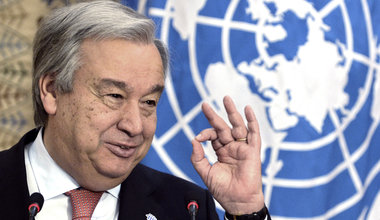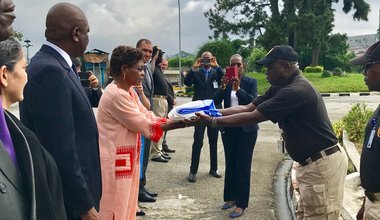Daily Brief on Côte d’Ivoire for Tuesday, 20 January 2009
Highlights
- Ivorian PM calls on political parties to stop making claims about identification fraud
- Local authorities send military reinforcement to protect returning IDPs
Electoral process
Following several allegations of fraud in the ongoing identification operation in areas under Forces Nouvelles (FN) control, which have been reported in the Ivorian media, the Prime Minister, Guillaume Soro, yesterday called on political parties to stop fuelling tension by making such claims. He insisted that the transparency of the process will not be affected and all possible fraud attempts and mistakes would be rectified during the data cross-checking and information-screening process, which comes after all the data have been collected. The Prime Minister made his statement in Bouaké during a meeting with representatives of the Regional Electoral Commission.
A supervisor with SAGEM, the technical operator for the identification, based in Daloa, has told UNOCI that five agents, including the chief of the local identification centre and his deputy, have been relieved of their duties pending an investigation. The five are accused of having been involved in demanding payments from members of the public in return for laminating their identification documents before handing them over. Meanwhile, many identification centres around the country remain close due to a strike by staff from the National Institute of Statistics.
Security
The Sous Prefet of Bloléquin (west) was on 16 January 2009, forced to send military reinforcement to Keibly village after a group of young people threatened to attack Baoulé planters who returned to their plantations on 13 January 2009. According to reports the youths were instigated by the village chief, who told them not to accept strangers in their forest. A UNOCI delegation met with the village chief yesterday and pleaded with him to support the local authorities' efforts to consolidate social cohesion in the area, which they said would be to the benefit of everyone.
NIGERBATT yesterday sent a patrol to Bemavogo on the Korhogo-Napié road (north) after receiving information that a woman had been shot dead and her driver seriously injured by two armed robbers who opened fire on a passenger minibus. Together with soldiers from the Armed Forces of the Forces Nouvelles (FAFN), the peacekeepers searched for the assailants, but they had already escaped. According to reports, the robbers opened fire on the vehicle when it refused to stop.
In Gnonfila, 15 km from Korhogo (north) on the Boundiali road, a public transport vehicle was attacked yesterday by hooded armed bandits who stole cash and personal belongings from passengers.
Arms embargo
UNOCI peacekeepers yesterday successfully carried out an arms embargo inspection at the 2nd Infantry battalion in Daloa (centre west)
Human Rights
The Regional Human Rights Office in Duekoué (west) on 15 January 2009, monitored the safe return of 269 internally displaced persons (IDPs) in the Moyen Cavally and 18-Mountains regions, notably in Guiglo, Toulépleu, Bangolo, Man, Kouibly, Danané and Zouan Hounien. This voluntary return operation was initiated by the local NGO "Saint-Viateur Côte d'Ivoire" which transported the IDPS from Abidjan to their respective communities. The returnees were given cash and food items from the Catholic mission in Bangolo and Man to facilitate their resettlement.
In collaboration with the local NGO "SOS Exclusion", the Regional Human Rights Office in Korhogo, organised a training workshop on the theme, "Human Rights, Democracy and Gender Education", for 20 teachers of five secondary schools in Korhogo on 16 January 2009. The aim of the workshop was to encourage the participants to set up and manage human rights clubs in their respective schools, with the view to educating students on citizenship and human rights.
The Regional Human Rights Office in Odienné (north), in collaboration with a local NGO "Ecole pour Tous", organized a human rights awareness-raising workshop for 55 teachers of an educational programme initiated by UNICEF and funded by the European Union. The programme, which is aimed at supporting the education of 1,500 pupils in the Denguelé region who have been deprived of their right to education since the beginning of the Ivoirian crisis in 2002, is expected to start on 26 January 2009.
 ONU
ONU Nations Unies Maintien de la paix
Nations Unies Maintien de la paix



